-
664 CRIMES AGAINST THE MEDIA AND JOURNALISTS COMMITTED BY RUSSIA IN THE 2 YEARS AND 8 MONTHS OF THE FULL-SCALE WAR
In September – October of 2024 the IMI recorded 27 crimes against the media and journalists committed by Russia: murder, threats, opening fire on journalists and shelling media offices, cyber attacks, and legal pressure.
Institute of Mass Information (IMI) — 27 October 2024 -
From Resilience to Recovery: Securing the Future of Ukrainian Media
This report shows the urgent need to focus on the economic reconstruction of the sector and estimates that $96 million is needed over three years to ensure the future of independent media outlets.
Reporters Without Borders (RSF) — 16 October 2024 -
Assessing the Suitability of the African Union Data Policy Framework for Digital Trade in Africa
The aim of this paper is to provide a better understanding of the transnational changes shaping digital trade with a view to informing how these might be reflected in holistic policy design and implementation in the African context.
Collaboration on International ICT Policy for East and Southern Africa (CIPESA) — 16 October 2024 -
“We Try to Stay Invisible”: Azerbaijan’s Escalating Crackdown on Critics and Civil Society
Azerbaijan is carrying out a vicious attack on government critics, independent groups, and media. The crackdown has intensified just months before Azerbaijan is to host COP29, the United Nations Climate Change Conference, which opens in Baku on 11 November 2024.
Human Rights Watch — 8 October 2024 -
State of Internet Freedom in Africa 2024
Africa’s Electoral Democracy and Technology: Pitfalls and Promises
Collaboration on International ICT Policy for East and Southern Africa (CIPESA) — 1 October 2024 -
Joint Submission by PEN International, Vietnamese Abroad PEN Centre and PEN America in Advance of the Fourth Universal Periodic Review of the Socialist Republic of Vietnam
Included among the concerns raised is the systematic misuse of the country’s legal system to criminalise critical expression towards the government or its policies.
PEN International, PEN America — 22 September 2024 -
Mapping Media Freedom Monitoring Report
The report explores in detail the 756 media freedom violations recorded by the MFRR partners in the first half of 2024. These violations affected 1,212 media-related persons or entities. 474 of these alerts were recorded in EU Member States while 282 took place in candidate countries.
Media Freedom Rapid Response — 11 September 2024 -
A tapestry of actors, attitudes, and impact: Countering disinformation in Africa
A study of the evolving disinformation landscape identifies key protagonists involved in the pushback and the tactics they employ to curb the escalating challenge.
Collaboration on International ICT Policy for East and Southern Africa (CIPESA) — 10 September 2024 -
Digital Security Among Palestinian Youth: A Study on Threats and Challenges in Light of the War on Gaza
This new study from 7amleh reveals how online harassment and cyber surveillance of young Palestinians has sparked a chilling rise in self-censorship.
7amleh – Arab Center for the Advancement of Social Media — 21 August 2024 -
The political influence industry In Canada
OpenMedia’s research report sheds light on dozens of secretive businesses that handle people’s sensitive voting behaviour data on behalf of federal political parties in Canada – with few effective rules limiting their actions.
OpenMedia — 15 August 2024 -
Tightening the Net: Iran’s new phase of digital repression
ARTICLE 19 examines how the Iranian regime is strengthening its hold over the internet through its Supreme Council of Cyberspace (SCC), with ever-increasing powers and under a new hardline leadership.
ARTICLE 19 — 24 July 2024 -
The European Union’s AI Act and its Implications for Palestinian Digital Rights
7amleh reveals how the EU legislation contains significant loopholes that could exacerbate human rights violations against Palestinians.
7amleh – Arab Center for the Advancement of Social Media — 24 July 2024 -
Freedom of expression and the press agenda – January, February, March 2024
In the first quarter of 2024, at least 210 journalists and media workers stood trial in 123 court cases. Nineteen journalists were sentenced in 16 of the 37 cases that concluded during the reporting period, while at least 10 new cases were filed against journalists.
P24 Platform for Independent Journalism — 14 June 2024 -
State of Online Blasphemy Cases and Unfolding Legal Saga
The report highlights that the rise of the internet has led to an increase in blasphemy prosecutions in Pakistan. The misuse of blasphemy laws has a chilling effect on freedom of expression online. Religious minorities are particularly vulnerable to blasphemy accusations.
Bytes for All — 25 April 2024 -
From Sharing to Silence: Assessing social media suppression of SRHR content in WANA
SMEX examines platform content moderation policies for sexual and reproductive health and rights in the West Asia and North Africa (WANA) region.
Social Media Exchange (SMEX) — 23 April 2024 -
Palestinian Digital Rights and the Extraterritorial Impact of the European Union’s Digital Services Act (DSA)
A new study examines discrimination and censorship concerns within the EU, affecting both Palestinians and global advocates for Palestinian human rights.
7amleh – Arab Center for the Advancement of Social Media — 10 April 2024 -
Press freedom in Europe: Time to turn the tide
The report raises concerns about the use of spyware, SLAPPs and journalists in exile.
Council of Europe Safety of Journalists Platform — 6 March 2024 -
Racism and Incitement Index
An average of 23 violent or hateful pieces of content were published against Palestinians every minute after 7 October, reports 7amleh.
7amleh – Arab Center for the Advancement of Social Media — 26 February 2024 -
Impacts of AI Technologies on Palestinian Lives and Narratives
An overview of the threats and dangers posed by AI tech on Palestinians and advocates.
7amleh – Arab Center for the Advancement of Social Media — 22 February 2024 -
“I Can’t Do My Job as a Journalist” The Systematic Undermining of Media Freedom in Hungary
The Hungarian government’s interference with media freedom and pluralism, part of its systematic attack on the rule of law, obstructs the work of independent journalists in holding the authorities to account and prevents the public from accessing information.
Human Rights Watch — 13 February 2024 -
Media Capture in Greece: Entanglement of the Fourth Estate
This report examines media capture in Greece through the four indicators of media capture: capture of private media, capture of public media, capture of the system of funding media and capture of media regulators.
International Press Institute — 30 January 2024 -
Meta’s Broken Promises: Systemic Censorship of Palestine Content on Instagram and Facebook
Human Rights Watch found that the problem stems from flawed Meta policies and their inconsistent and erroneous implementation, overreliance on automated tools to moderate content, and undue government influence over content removals.
Human Rights Watch — 5 January 2024 -
Economic slump takes toll on sustainability of free media
A total 52 incidents of press freedom violations were recorded in 2023, while Freedom Forum’s annual media report shows the severe impact of the economic downturn on Nepali media.
Freedom Forum — 2 January 2024 -
Israel’s Surveillance Industry and Human Rights: Impact on Palestinians and Worldwide
The report provides an overview on the reality of the Israeli surveillance systems industry, outlines its impact on the human rights of Palestinians and implications worldwide.
7amleh – Arab Center for the Advancement of Social Media — 19 December 2023 -
A Light That Cannot Be Extinguished: Exiled Journalism and Transnational Repression
Journalists living in exile face assault, harassment, and unlawful deportation at the hands of the governments they fled.
Freedom House — 11 December 2023 -
Privacy First: A Better Way to Address Online Harms
In this report, EFF explores a new approach to tackling online harms leaving behind strategies based on ill-conceived bills and censorship-driven solutions.
Electronic Frontier Foundation — 15 November 2023 -
Toxic Narratives: Silencing Expression in the Western Balkans
PEN International — 29 October 2023 -
Shouting into the void: Why reporting abuse to social media platforms is so hard and how to fix it
When PEN America and Meedan asked writers, journalists, and creators about their experiences reporting online abuse to social media platforms, thet heard again and again, over the past three years, about the deep frustration, exasperation, and harm caused by the reporting mechanisms themselves.
PEN America — 25 October 2023 -
Freedom on the Net 2023: The Repressive Power of Artificial Intelligence
Freedom House has found that while innovations in AI contributed to the 13th consecutive year of global decline in internet freedom, older forms of digital repression continued to proliferate.
Freedom House — 4 October 2023 -
Murdered, surveilled, and sued: Decisive action needed to protect press freedom in Greece
Joint press freedom mission to Greece concludes with a call on the government to show political courage and take specific measures to improve the climate for independent journalism.
Media Freedom Rapid Response — 1 October 2023 -
MÉTODO CUBA: Independent artists’ testimonies of forced exile
Two years after historic July 11 Demonstrations in Cuba, the plight of writers and artists forced Into exile underscores the drastic deterioration of artistic freedom on the island.
PEN International — 12 July 2023 -
Pakistan network shutdown report 2022
A report from Bytes for All showed that Pakistan faced 24 network shutdowns in 2022, which is 58% higher than in 2021.
Bytes for All — 9 July 2023 -
Latin America in a Glimpse 2023
A peek at the gaps shaping our experiences on the internet.
Derechos Digitales — 20 June 2023 -
An Analysis of Israeli Inciteful speech against the Village of “Huwara” on Twitter
This report outlines the volume, nature, and patterns of inflammatory and violent speech in Hebrew directed at the village of Huwara on Twitter between the beginning of the year and the end of March, which contributed to the implementation of a number of attacks by settlers on the villagers and their properties and causing harm to them.
7amleh — 9 June 2023 -
Harassment of fact-checking media outlets in Europe
Survey finds that 90% of fact-checking outlets in Europe have been the target of online harassment and smear campaigns.
International Press Institute — 7 June 2023 -
The Unfreedom Monitor: Venezuela Country Report
The Unfreedom Monitor report provides insights into the current state of freedom in Venezuela and highlights challenges faced by journalists and media in the country.
Global Voices Advox — 6 June 2023 -
The Unfreedom Monitor: El Salvador country report
This report analyses two major incidents: the disclosure that Pegasus spyware has been used against journalists from independent media outlets and representatives of civil society, and Bukele’s legal advisor’s threats against two women journalists for not revealing anonymous sources included in a news story.
Global Voices Advox — 24 May 2023 -
Finding 404: A report on website blocking in India
The report traces this form of censorship done through blocking of websites, applications, and social media accounts in India.
SFLC.in — 20 May 2023 -
The Unfreedom Monitor – Ecuador Country Report
A methodology for tracking digital authoritarianism around the world.
Global Voices Advox — 16 May 2023 -
Fragile Progress: The struggle for press freedom in the European Union
The European Union is facing numerous challenges as it seeks new ways to uphold its commitment to press freedom. This special report examines the EU’s response to threats such as murders of journalists, pandemic-related media controls, spyware, and the war in Ukraine.
Committee to Protect Journalists — 27 April 2023 -
Still Not Safe: Transnational Repression in 2022
Perpetrators from a total of 20 states were responsible for 79 incidents of physical transnational repression last year, including the first documented cases originating in Djibouti and Bangladesh.
Freedom House — 10 April 2023 -
Freedom in the World 2023
Marking 50 years in the struggle for democracy
Freedom House — 13 March 2023 -
War in Europe and the fight for the right to report
The report reveals a continued degradation of press freedom across the continent. Throughout 2022, the Platform documented 289 alerts concerning 37 countries, with journalists being murdered, imprisoned, physically attacked, legally harassed, and subjected to smear campaigns.
EFJ and Partner Organisations of the CoE Platform to Promote the Protection of Journalism and Safety of Journalists — 7 March 2023 -
Sexual Violence Against Indonesian Female Journalists
The study showed that Indonesian female journalists have experienced various forms of sexual violence in the workplace and in the course of fulfilling their duties in the field.
Aliansi Jurnalis Independen/Alliance of Independent Journalists (AJI) — 4 March 2023 -
‘All This Terror Because of a Photo’: Digital Targeting and Its Offline Consequences for LGBT People in the Middle East and North Africa
The report examines the use of digital targeting by security forces and its far-reaching offline consequences – including arbitrary detention and torture – in five countries: Egypt, Iraq, Jordan, Lebanon, and Tunisia.
Human Rights Watch — 27 February 2023 -
Privacy International’s comments on the zero draft of the WHO convention, agreement or other international instrument on pandemic prevention, preparedness and response (“WHO CA+”
PI welcomes the inclusion of a provision on confidentiality and privacy. But there are still significant gaps in the zero draft which need to be addressed to ensure the treaty puts the respect and protection of human rights at the centre of the prevention and response to future pandemics including ensuring the effective regulation of the private-sector entities.
Privacy International — 22 February 2023 -
Safety of female journalists in West Africa and Nigeria
Research carried out by the IPC and the MFWA indicates that the challenges faced by women journalists in doing their work include harassment, sexual advances, threats, and prejudice.
International Press Centre, Media Foundation for West Africa — 14 February 2023 -
MFRR’s annual overview of media freedom violations in Europe
140 media freedom violations were recorded in Ukraine alone, which amount to 17.2% of the total registered in all analysed countries. The war in Ukraine also accounted for nine of the 10 killings of journalists during the year.
International Press Institute (IPI) — 8 February 2023 -
Hashtag Palestine 2022
This report diagnoses the state of digital freedoms, and outlines the most prominent patterns of digital rights violations and their trends during 2022.
7amleh – Arab Center for the Advancement of Social Media — 7 February 2023 -
Violations of media freedoms in Palestine – Annual Report 2022
A rise in serious violations against journalists last year included the murder of Shireen Abu Akleh and Ghufran Warasneh, documents a new report from Mada Center.
Palestinian Center for Development and Media Freedoms (MADA) — 1 February 2023 -
Mass Media in Belarus” No. 1 (71), 2023 Annual Review 2022
BAJ’s review of 2022 highlights 33 journalists in prison, 17 heavy prison sentences, and nine media outlets classified as “extremist organisations”.
Belarusian Association of Journalists — 22 January 2023 -
Privacy and Protection: A children’s rights approach to encryption
This report aims to capture the full complexity of how encryption affects children’s lives. It sets out principles for an approach to encryption that recognises and respects the full range of their rights.
Child Rights International Network (CRIN) — 20 January 2023 -
Bangladesh: Attacks and authoritarian laws stifle press freedom
Press freedom violations in Bangladesh, April-September 2022.
International Press Institute — 18 January 2023 -
Finding 404: A report on website blocking in India
With the advancement of access to the internet and the consequent manifold increase in using the internet as a platform for exercising speech and expression, there has also been an increase in censorship of expression. The report traces this form of censorship carried out through the blocking of websites, applications, and social media accounts in India.
SFLC.in — 16 January 2023 -
Let The Net Work: Internet Shutdowns in India 2022
The previous decade has witnessed an exponential increase in internet shutdowns in India with a total count of 690, out of which 110 had been implemented in the year 2021. The year 2022 has seen 75 shutdowns till the publication of this report.
SFLC.in — 26 December 2022 -
Thailand: Denying the demand for democracy
The Thai government’s treatment of pro-democracy protesters has been discriminatory and violated their rights to freedom of expression and peaceful assembly, ARTICLE 19 found. Thai authorities exploited the COVID-19 pandemic to enact repressive emergency measures and aggressively and expansively deployed Section 112 of the Criminal Code against protesters.ARTICLE 19 — 19 December 2022 -
Declaration of principles for content and platform governance in times of crisis
The Declaration of Principles for content and platform governance in times of crisis is an effort to advance consistent and rights-respecting principles for companies to respond appropriately to crises and meet their obligations and responsibilities under international human rights law.
ARTICLE 19 — 30 November 2022 -
Violating Network. Gender-Based Violence against Palestinian Women in the Digital Space
Gender-based violence has seen a dramatic increase in the Palestinian digital space over the last several years, reveals this new report from 7amleh.
7amleh – Arab Center for the Advancement of Social Media — 29 November 2022 -
Unfreedom Monitor
The Unfreedom Monitor is a project to analyze, document, and report on the growing use of digital communications technology to advance authoritarian governance around the world.
Global Voices Advox — 16 November 2022 -
End Impunity, Protect Journalists
A report published by the Gulf Centre for Human Rights to mark the International Day to End Impunity
Gulf Centre for Human Rights — 1 November 2022 -
Connecting the Dots: Artist Protection & Artistic Freedom in Asia
The report captures growing anxiety among artists and creative practitioners across South, Southeast, East, and Central Asia around stringent security laws, the lack of unencumbered spaces for free expression, and the impact of authoritarian measures to crack down on artistic production and criminalize free expression.
PEN America — 22 October 2022 -
Special report: When spyware turns phones into weapons
How zero-click surveillance threatens reporters, sources, and global press freedom
Committee to Protect Journalists — 19 October 2022 -
FREEDOM ON THE NET 2022
Countering an authoritarian overhaul of the internet
Freedom House — 18 October 2022 -
Securing Privacy: Privacy International on end-to-end encryption
In a new report, Privacy International explores the human rights implications of end-to-end encryption, and rejects proposals by governments, intelligence agencies and law enforcement agencies for access to the content of or the banning of this type of communication.
Privacy International — 20 September 2022 -
Beijing’s global media influence 2022
A new report from Freedom House highlights the Beijing government’s global campaign to shape public opinion and secure both its hold on power in China and its policy priorities abroad.
Freedom House — 14 September 2022 -
OHCHR Assessment of human rights concerns in the Xinjiang Uyghur Autonomous Region, People’s Republic of China
The report by the outgoing UN High Commissioner for Human Rights, Michelle Bachelet, contains victim accounts that substantiate mass arbitrary detention, torture, cultural persecution, forced labor, and other serious human rights violations, and recommends that states, businesses, and the international community take action with a view to ending the abuses, and advancing justice and accountability.
Human Rights Watch — 4 September 2022 -
“Through The Looking Glass: Digital Safety and Internet Freedom in South and Southeast Asia
With almost all independent media institutions eradicated, Cambodian people have been forced to rely largely on social media and other online platforms to access news and information.
Cambodian Center for Independent Media (CCIM) — 16 August 2022 -
Malaysia: Criminalisation of blasphemy – 2022 update
In July 2022, ARTICLE 19 documented a number of concerning cases in which individuals were prosecuted for allegedly blasphemous speech. Malaysian authorities have investigated individuals under Section 298A of the Penal Code, Section 233 of the Communications and Multimedia Act, and the Sedition Act.
ARTICLE 19 — 12 August 2022 -
They’ll Get You No Matter What: Morocco’s Playbook to Crush Dissent
Human Rights Watch documents a range of tactics that, when used together, form an ecosystem of repression, aiming not only to muzzle dissenting voices but to scare off all potential critics.
Human Rights Watch — 9 August 2022 -
Survey of attitudes towards Privacy and Data Protection in the Palestinian Context
New survey demonstrates an urgent need for comprehensive privacy and data protection Palestinian legislation that can protect all citizens’ right to privacy and ensure accountability.
7amleh – Arab Center for the Advancement of Social Media — 4 July 2022 -
Privacy and personal data protection in Palestine: Double violations and absent legislation
This report sheds light on the issue of privacy and data protection in Palestine, examining the extent to which Palestinians’ privacy is respected and personal data protected.
7amleh - Arab Center for the Advancement of Social Media — 27 June 2022 -
Content moderation and local stakeholders in Kenya
The study mapped the capacity, knowledge, and needs of various stakeholders from government, civil society, private sector, and academia in relation to their work on content moderation.
ARTICLE 19 — 24 June 2022 -
Content moderation and local stakeholders in Indonesia
Effective content moderation in a big and diverse country such as Indonesia requires a transparent and sustainable dialogue between platforms and local civil society groups.
ARTICLE 19 — 24 June 2022 -
Content moderation and local stakeholders in Bosnia and Herzegovina
With a focus on Bosnia and Herzegovina (BiH) and as a contribution to the Social Media 4 Peace project, implemented by the United Nations Educational, Scientific and Cultural Organization (UNESCO) with partner ARTICLE 19, this report explores the local-specific contextual concerns stemming from global, non-transparent, and profit-driven content moderation processes of social media.
ARTICLE 19 — 24 June 2022 -
Content moderation and freedom of expression: Bridging the gap between social media and local civil society
This report presents a summary analysis of research on current practices of content moderation in Bosnia and Herzegovina, Indonesia ‘harmful content’ such as ‘hate speech ’, and Kenya, with a specific focus on and disinformation.
ARTICLE 19 — 24 June 2022 -
Defending Democracy in Exile: Policy Responses to Transnational Repression
Physical transnational repression is only the tip of an iceberg. Digital threats, spyware, and coercion by proxy means that – for millions of people around the world – transnational repression has become a common and institutionalised practice.
Freedom House — 11 June 2022 -
Nepali media still in crisis
Freedom Forum published its annual World Press Freedom Day report which highlighted the attacks against journalists in Nepal over the past year.
Freedom Forum — 8 June 2022 -
Mapping gaps in digital access in Pakistan
A new research by Media Matters for Democracy looks into the policies of the government and the experience of Pakistan in improving access to internet connection.
Media Matters for Democracy — 8 June 2022 -
The Survival Toolkit for Journalists: How to protect yourself against Digital Surveillance
The guide was developed in response to the growing threat of digital surveillance and cyber security legislation, used by governments and others to track and monitor journalists in their efforts to harass and muzzle journalists from carrying out their work.
Media Institute of Southern Africa (MISA) — 23 May 2022 -
Malaysian media landscape brief 2021
The Centre for Independent Journalism has published a brief about the state of media in Malaysia, the impact of the pandemic, and its recommendations to the Malaysian government on upholding freedom of expression.
Centre for Independent Journalism — 8 May 2022 -
Media Monitoring on Gender and Elections Monthly Report
Maharat Foundation and Madanyat Association work with UN Women to monitor television and social media1 concerning violence against women in politics in the period prior to the 2022 parliamentary elections. This summary provides a quick overview of the findings during the months of February and March.
Maharat Foundation — 27 April 2022 -
Freedom to Write Index 2021
Writers and public intellectuals have been unjustly locked up for their exercise of free expression; dozens are currently serving sentences of 10 years or more for their words.
PEN America — 19 April 2022 -
Digital taxation in Uganda: A hindrance to inclusive access and use of digital technologies
Uganda is ranked 116th out of 130 countries in the 2021 Network Readiness Index which assesses the application and impact of technology in economies around the world. Compared to her neighbours Kenya, Rwanda and Tanzania, Uganda scores lowest on GSMA’s Mobile Connectivity Index, which measures key enablers of mobile internet adoption such as infrastructure, affordability, content and services.
Collaboration on International ICT Policy for East and Southern Africa (CIPESA) — 18 April 2022 -
West Africa: Freedom of Expression Monitor, Oct-Dec 2021
The democratic revolution in West Africa over the past three decades has come under a strain in the past few years with serious implications for press freedom and the civic space.
Media Foundation for West Africa — 18 April 2022 -
Bahrain 2021: Stagnation and No Signs of Change
According to the BCHR Annual Report, the human rights situation did not improve in 2021. The authorities are still intolerant to dissent and criticism and restrict Bahrainis’ exercise of internationally-guaranteed fundamental rights.
Bahrain Center for Human Rights — 12 April 2022 -
Review of cybercrime cases in Nepal
This report analyzes 100 judgments on cybercrime cases made by local courts in Nepal.
Freedom Forum — 3 April 2022 -
Controlling the Message: Challenges for independent reporting in Greece
Report of the 1-15 December 2021 joint fact-finding mission. The partner organisations conclude that challenges to the independence of the media and the safety of journalists are systemic in the country. While the problems are not unique, their intensity is highly problematic and sets it apart from most other EU Member States.
Media Freedom Rapid Response (MFRR)/Reporters Without Borders — 29 March 2022 -
Gender violence against journalists
This report, supported by UNESCO’s Global Media Defense Fund, provides an overview of violence against women journalists and gender-based attacks on communicators in Brazil in 2021.
Brazilian Association of Investigative Journalism (Abraji) — 9 March 2022 -
Internet Shutdowns and Human Rights
Submission in response to the call for comments by the Office of the High Commissioner for Human Rights as input for the report on internet shutdowns and human rights to the fiftieth session of the Human Rights Council in June 2022.
Derechos Digitales & APC — 4 March 2022 -
Mapping media freedom – Monitoring Report 2021
Attacked while covering demonstrations, harassed online for reporting on COVID�19 and measures to fight it, or sued by private companies trying to avoid publication of damaging information. These are just some examples of the threats received by journalists and media workers in Europe in 2021.
Media Freedom Rapid Response (MFRR)/International Press Institute — 23 February 2022 -
Patterns of torture in the United Arab Emirates
“This report, which is rich with documented facts and detailed case studies, confirms that torture in the UAE is systematic. Furthermore, as a totalitarian state, torture is carried out on direct instructions from the highest authorities in the country.”
Gulf Centre for Human Rights (GCHR) — 11 February 2022 -
RSF report: “The Great Leap Backwards of Journalism in China”
This 82-page report from Reporters Without Borders (RSF) details Beijing’s strategy to control access to information within and beyond its borders.
Reporters Without Borders (RSF) — 3 February 2022 -
Mapping and analysis of Privacy Laws in Africa
While privacy has become ever more crucial in the world where digital technologies are key to livelihoods and rights, there are insufficient protections for the right to privacy in many African countries.
Collaboration on International ICT Policy for East and Southern Africa (CIPESA) — 31 January 2022 -
SURVEILLANCE SELF-DEFENSE TIPS, TOOLS AND HOW-TOS FOR SAFER ONLINE COMMUNICATIONS
Read the BASICS to find out how online surveillance works. Dive into our TOOL GUIDES for instructions to installing our pick of the best, most secure applications. We have more detailed information in our FURTHER LEARNING sections. If you’d like a guided tour, look for our list of common SECURITY SCENARIOS.
Electronic Frontier Foundation — 28 January 2022 -
Hashtag Palestine 2021
The report highlights digital rights violations of Palestinians and pro-Palestinian advocates online, at the hands of the three authorities, as well as different social media companies in relation to the escalations and developments on the ground.
7amleh – Arab Center for the Advancement of Social Media — 11 January 2022 -
Indonesia: Situation of media in 2021
The Alliance of Independent Journalists releases its annual report on the state of media freedom in Indonesia. It documented 43 cases of violence against journalists throughout 2021.
Alliance of Independent Journalists (AJI) — 5 January 2022 -
Towards an Accessible and Affordable Internet in Africa: Key Challenges Ahead
The internet plays a vital role in the realisation of human development and facilitates the enjoyment of several human rights and freedoms, including the right to freedom of expression and information, the right to education, the right to assembly and association. Over the last few years, Africa has experienced exponential growth in internet access spurred by mobile internet, which stood at 28% penetration in 2020.
Share on social media Collaboration on International ICT Policy for East and Southern Africa (CIPESA) — 5 January 2022 -
The other impact of COVID-19: Heightened Surveillance and Tracking in Gulf & Neighbouring Countries
The specific focus of this report is on the intersections between freedoms of speech, expression and press, the right to privacy and governments’ responses to the pandemic.
Gulf Centre for Human Rights (GCHR) — 26 December 2021 -
SADC: State of Broadcasting and Digital Migration in the Region
This report focuses on the progress made regarding the state of broadcasting and digital migration in Angola, Botswana, South Africa and Zimbabwe.
Media Institute of Southern Africa (MISA) — 26 December 2021 -
Sudan’s Bad Laws, Internet Censorship and Repressed Civil Liberties
This brief explores the repressive elements of media and technology-related laws in Sudan and how they have been used to undermine freedom of expression and other civil liberties in the aftermath of president Omar al-Bashir’s April 2019 overthrow.
Collaboration on International ICT Policy for East and Southern Africa (CIPESA) — 23 December 2021 -
No to Impunity: Murders & other serious violations continue against MENA journalists
Journalists in most MENA countries continue to face all forms of repression, intimidation, and harassment, including the use of the judiciary to prevent them from carrying out their professional journalistic work. The Gulf Centre for Human Rights (GCHR) has documented many cases of journalists murdered or abused, most carried out with total impunity.
Gulf Centre for Human Rights (GCHR) — 3 November 2021 -
Attacks on the media in Pakistan, January-October 2021
The space for free expression in Pakistan continues to shrink with the media facing attacks on all fronts. Pakistan Press Foundation (PPF) has observed an alarming trend during 2021 where not only did physical attacks against the media continue with impunity but the state level push to restrict free expression also grew.
Pakistan Press Foundation — 1 November 2021 -
Online harassment of the media in Pakistan in 2021
The media in Pakistan works within an increasingly repressive environment with the attacks on press freedom coming from all fronts. While physical attacks including abductions, manhandling, arrests and in some instances killings of journalists for their work continue, as online spheres such as social media platforms are of growing importance to the work of media professionals, journalists become the subject of attacks online.
Pakistan Press Foundation — 1 November 2021 -
How African governments undermine the use of encryption
Worryingly, many African countries have passed legislation that limits anonymity and the use of encryption, purportedly to aid governments’ efforts to combat terrorism and crime. Other governments limit the use of encryption to enable them to monitor the communications of critical journalists, human rights defenders, and opposition politicians.
Collaboration on International ICT Policy for East and Southern Africa (CIPESA) — 26 October 2021 -
Effects of State Surveillance on Democratic Participation in Africa
Surveillance has become a principal threat to digital rights in Africa, a weakening force to civil society and independent voices, and ultimately a driver of authoritarianism.
Collaboration on International ICT Policy for East and Southern Africa (CIPESA) — 12 October 2021 -
Legal analysis: Regulation of the Minister of Communication and Informatics Number 5 of 2020 on Private Electronic System Operators
Ministerial Regulation 5 governs the functioning of private electronic systems operators (ESOs) accessible in Indonesia which include social media platforms, search engines, ecommerce platforms, games, and communications services.
ARTICLE 19 — 5 October 2021 -
Hateful Network: Hate Speech on Social Media Platforms Among Palestinians and its Impact on Their Digital Rights
The study indicates a noticeable increase in the use of hate speech among Palestinians on social media platforms, influenced by events and tensions in regional politics, as well as by global events generally. Hate speech is influenced by internal disturbances and changes in the Palestinian scene, particularly at the social and political levels, whether In the West Bank, Gaza Strip, Jerusalem, or in the 1948 territories.
7amleh – Arab Center for the Advancement of Social Media — 30 September 2021 -
Sri Lanka: Media freedom report 2020
This report by the Free Media Movement provides an overview of the state of media freedom in Sri Lanka in 2020.
Free Media Movement — 24 September 2021 -
Under Attack. A report on the security and judicial campaigns targeting human rights defenders and independent human rights organizations in Egypt
Association for Freedom of Thought and Expression (AFTE) — 24 September 2021 -
Freedom on the Net 2021: The global drive to control big tech
In the high-stakes battle between states and technology companies, the rights of internet users have become the main casualties. A growing number of governments are asserting their authority over tech firms, often forcing the businesses to comply with online censorship and surveillance.
Freedom House — 23 September 2021 -
Spain: Ministerial Order Establishing the National Procedure Against Disinformation
In this analysis, ARTICLE 19 reviews the Ministerial Order the Ministerial Order for its compliance with international freedom of expression standards. The Order was approved by the National Security Council of Spain and published on 30 October 2020 by the Minister of the Presidency.
ARTICLE 19 — 15 September 2021 -
Internet landscape of Pakistan 2020
This Bytes for All report maps Pakistan’s internet landscape highlighting digital trends and their impact on socio-economic developments, as well as challenges and threats in the digital age during 2019-20.
Bytes for All — 9 September 2021 -
The Reality of Privacy & Digital Data Protection in Palestine
This study seeks to identify the reality of privacy and protection of digital personal data in Palestine1 in terms of the collection, processing and use of Palestinian users’ data. It addresses some of the human rights violations faced by Palestinian users as well as the key parties that violate their data privacy.
7amleh – Arab Center for the Advancement of Social Media — 25 August 2021 -
Chasing Justice. Study on impunity for crimes against journalists
The report describes the types of violence and threats journalists encounter, along with the nature and frequency of different types of violations.
Maldives Journalists Association (MJA), International Federation of Journalists (IFJ) — 24 August 2021 -
Mongolia: Media Freedom Report 2020
Around 80 cases of political and civil rights violations were documented by Globe International Center in its latest media freedom report in Mongolia.
Globe International Center — 22 August 2021 -
Splintered Speech: Digital Sovereignty and the Future of the Internet
Today, governments across the globe are arguing for new powers to regulate the internet within their countries’ borders for national security, economic health, and other fundamental reasons.
PEN America — 17 August 2021 -
Public Prosecution and digital transformation: An introduction to mass surveillance of the internet
The Public Prosecution needs to stop monitoring internet users out of respect for the privacy of citizens. The decision to establish the Monitoring and Analysis Unit (MAU) contradicts a number of laws and legal principles, not to mention the lack of transparency about the way it conducts its work.
Association for Freedom of Thought and Expression (AFTE) — 17 August 2021 -
Mapping and analysis of privacy laws and policies in Africa – summary report, July 2021
Over the years, many African countries have enacted laws and adopted policies that impact on privacy, including those that facilitate surveillance and the collection of biometric data, and others that limit the use of encryption. This has facilitated increased state surveillance across the continent that is accelerating interference with various rights and freedoms.
Collaboration on International ICT Policy for East and Southern Africa (CIPESA) — 21 July 2021 -
Freedom in tatters
The Hong Kong press industry faced increasing threats in the past 12 months. Suppression from the authorities is felt across different forms of media; freedoms have seriously deteriorated under a repressive government.
Hong Kong Journalists Association — 18 July 2021 -
Unplugged in Myanmar: Internet restrictions following the military coup
This briefing paper first explains internet restrictions that the NLD-led government put in place before the coup. It then sets out a timeline of the implementation of internet restrictions since 1 February.
ARTICLE 19 — 15 July 2021 -
“‘My Life is Not Your Porn’: Digital Sex Crimes in South Korea”
Digital sex crimes are crimes involving non-consensual intimate images. These crimes are a form of gender-based violence, using digital images that are captured non-consensually and sometimes shared, captured with consent but shared non-consensually, or sometimes faked.
Human Rights Watch — 20 June 2021 -
Privacy International’s submission for the UN High Commissioner for Human Rights’ report on the right to privacy and artificial intelligence
If implemented responsibly, AI has the potential to promote the enjoyment of human rights. However, there is a real risk that commercial and state use has a detrimental impact on human rights
Privacy International — 15 June 2021 -
Biometrics and counter-terrorism: Case study of Somalia
Most Somalis have little knowledge or say over how their sensitive biometric data is used or shared.
Privacy International — 8 June 2021 -
Biometrics and counter-terrorism: Case study of Israel/Palestine
The Israeli state routinely surveils and severely restricts Palestinians’ freedom of movement using myriad technologies, including biometrics, which result in furthering the policies of systemic segregation.
Privacy International — 8 June 2021 -
Biometrics and counter-terrorism: Case study of Iraq and Afghanistan
This research shows how the U.S. Department of Defense’s biometric programme was developed and implemented without prior assessment of its human rights impact and without the safeguards necessary to prevent its abuse. Its whereabouts and current use today remain unclear.
Privacy International — 8 June 2021 -
Freedom of Expression and the Press Agenda
As the Expression Interrupted platform, which has been operating as part of the Platform for Independent Journalism (P24) since 2017, we present our first periodic report with the aim of sharing the results of our efforts to track violations of freedom of expression and the press in Turkey with the general public more effectively.
P24 Platform for Independent Journalism (Expression Interrupted) — 26 May 2021 -
Privacy International’s submission on disinformation to the UN rapporteur
Privacy International (PI) welcomes the call for submissions by the UN Special Rapporteur on the promotion and protection of the right to freedom of opinion and expression to inform the Special Rapporteur’s report on ‘disinformation’ and freedom of expression. The issues highlighted in the call for submissions are ones that PI with its global network of partners3 has been investigating as part of its work on the use of personal data, and the hidden ecosystem involved, in the online political campaigning context.
Privacy International — 20 May 2021 -
2020 Annual Report – Media Foundation for West Africa
The outbreak of COVID-19 in 2020 further threatened the already precarious safety of journalists and media sustainability challenges in West Africa. Despite the obvious risks and challenges, journalists and other media workers navigated partial and full lockdowns to gather news about the coronavirus disease and filed reports often using unstable internet connections, to keep the public informed.
Media Foundation for West Africa (MFWA) — 17 May 2021 -
Globe International Center annual report 2020
IFEX member Globe International Center has released its annual report which details the activities, campaigns, and programs it implemented in 2020.
Globe International Center — 1 May 2021 -
World Press Freedom Index 2021
Reporters without Borders — 20 April 2021 -
Access denied: How telecoms operators in Africa are failing persons with disabilities
While a great number of people now use ICT for a growing range of tasks, many persons with disabilities in Africa still find it hard to access and use digital technologies. As a result, they continue to miss out on the potential digital dividends.
Collaboration on International ICT Policy for East and Southern Africa (CIPESA) — 19 April 2021 -
Online hatred pushing minorities to the periphery: B4A report ‘online hate speech’
Hate speech has long been pervasive in Pakistani society, especially directed towards individuals and groups belonging to minority faiths (and those of no faith). Those not following the majority’s Sunni faith, are given different titles and labels while several stereotypes are associated with different faiths, sects and religions, including Christians, Hindus, Ahmadis, Sikhs and Shias. However, when it comes to online spaces where more and more people are joining different social media platforms to express their views and share their opinions (or those of others whom they support), these labels, titles and stereotypes get hugely amplified, attracting widespread attention across whole communities.
Bytes for All — 3 April 2021 -
New aspects of human rights crises during the Covid-19 pandemic – Annual Report 2020
The Arab Spring erupted a decade ago, yet the reasons behind this wave of uprisings remain unaddressed. The Arab Spring’s aftermath continues to ripple across the region, even in Tunisia, the only country that had progressed to democratic transition. These ripple effects have coalesced into unique forms, depending on the country. In countries such as Egypt, political repression has deepened, while the struggle over societal values are simply surface indicators of deeply entrenched issues. Meanwhile, armed conflict prevails in Yemen, Libya, Syria, and Iraq, where civil society has embraced a heroic role in its traditional and modern forms of organization. In Tunisia, Sudan, and Lebanon, where there is relative freedom, the political frontlines are clearer.
Cairo Institute for Human Rights Studies (CIHRS) — 28 March 2021 -
Human Rights In the Gulf Region and Neighbouring Countries in the Face of Lockdowns and more Layers of Restrictions
In this annual report, GCHR presents a summary of our e#orts in advocating for HRDs, activists, journalists and citizens in exercising their human rights and freedoms and protecting these rights in the region.
Gulf Centre for Human Rights — 26 March 2021 -
Sexism’s Toll on Journalism
To mark International Women’s Day, RSF has published this report that reveals the extent of the dangers of sexist and sexual violence for women journalists, and its impact on journalism.
Reporters Without Borders — 9 March 2021 -
How the Covid-19 fight has hurt digital rights in East Africa
The fight against the novel coronavirus (COVID-19) pandemic in Kenya, Tanzania, and Uganda has dealt a blow to the promotion and preservation of human rights in the region. Moreover, the outbreak of COVID-19 could not have come at a worse time, as the countries were preparing for their respective general elections.
Collaboration on International ICT Policy for East and Southern Africa (CIPESA) — 23 February 2021 -
LAPD requested Ring footage of Black Lives Matter protests
Along with other civil liberties organizations and activists, EFF has long warned that Amazon Ring and other networked home surveillance devices could be used to monitor political activity and protests. Now we have documented proof that our fears were founded.
Electronic Frontier Foundation — 16 February 2021 -
Out of Sight, Not Out of Reach
The Global Scale and Scope of Transnational Repression
Freedom House — 9 February 2021 -
Device seizures in Lebanon
Assessing the Legal Framework concerning device seizures in Lebanon.
Social Media Exchange — 2 February 2021 -
A Safety Guide for Artists
In creating this manual, ARC aspires to offer concrete recommendations and provide a comprehensive tool kit to help artists navigate, counter, and overcome threats and persecution.
PEN America — 27 January 2021 -
EFF transition memo to incoming Biden administration
While EFF hopes to work with President Biden on a wide range of policies that affect digital rights in the coming years, it focuseshere on the ones that need his immediate attention and ask that he change course on the previous policies and practices discussed below.
Electronic Frontier Foundation — 25 January 2021 -
Women Disconnected: Feminist Case Studies on the Gender Digital Divide Amidst COVID-19
This study examines the impact of the gender digital divide on women in Pakistan during the coronavirus pandemic.
Media Matters for Democracy — 17 January 2021 -
Freedom Forum annual press freedom report – 2020
Freedom Forum recorded a total of 96 press freedom violations during 2020. Although the number of violations declined slightly compared to the previous year (111 in 2019), the country still awaits an improvement in the press freedom atmosphere.
Freedom Forum — 13 January 2021 -
MEDIA AND PRESS FREEDOM IN PAKISTAN 2020: Annual report by Pakistan Press Foundation, January 2021
In 2020 Pakistani media was confronted with unique new challenges, both in terms of content to cover as well as in the nature of the measures restricting press freedom and the free flow of information in the country.
Pakistan Press Foundation — 3 January 2021 -
Turkey’s Journalists on the Ropes: Joint International Press Freedom Mission to Turkey, October 6-9, 2020
The mission was organised in the wake of the Covid-19 pandemic, the sharp rise in targeting of media by regulators, increased physical attacks on journalists and a new restrictive law on social media with the potential to impose further limitations on the remaining spaces for independent reporting and public commentary.
International Press Institute — 1 December 2020 -
#WhatsHappeningInThailand: Government crackdown on the right to protest
The protesters’ complaints about the government’s anti-democratic nature have been underscored by the authorities’ response to the protests. The government has harassed and obstructed protest organisers at every turn. At least 173 individuals have been charged because of their role in protests this year.
ARTICLE 19 — 28 October 2020 -
African civic tech and COVID-19: Five emerging trends
Since the outbreak of COVID-19, various technologies have been deployed by citizens, NGOs, start-ups, private companies, universities and governments to aid the fight against COVID-19.
Collaboration on International ICT Policy for East and Southern Africa (CIPESA) — 27 October 2020 -
Freedom on the Net 2020 – The Pandemic’s Digital Shadow
The coronavirus pandemic is accelerating a dramatic decline in global internet freedom. For the 10th consecutive year, users have experienced an overall deterioration in their rights, and the phenomenon is contributing to a broader crisis for democracy worldwide.
Freedom House — 14 October 2020 -
Iran: Tightening the Net 2020 – After Blood and Shutdowns
Government ordered Internet shutdowns are fast becoming a key tactic to disconnect people from each other and to prevent us from scrutinising our governments’ actions.
During nation-wide protests in November 2019 Iran’s government cut off the Internet for over 80 million people. As the shutdown continued the authorities attacked and killed hundreds.
ARTICLE 19 — 13 October 2020 -
Fake News in Palestine: Exploratory Research into Content, Channels and Responses
In recent months, since the beginning of the coronavirus pandemic, the internet has been flooded with misinformation and fake news about the coronavirus. This led 7amleh to urgently consider how to more effectively research and monitor the phenomena of fake news in Palestine and engage the public in a conversation about media literacy, misinformation and fake news.
7amleh – Arab Center for the Advancement of Social Media — 10 September 2020 -
‘Video Unavailable’: Social Media Platforms Remove Evidence of War Crimes
In recent years, social media platforms have been taking down online content more often and more quickly, often in response to the demands of governments, but in a way that prevents the use of that content to investigate people suspected of involvement in serious crimes, including war crimes.
Human Rights Watch — 10 September 2020 -
Fundamental rights under siege: Exceptional circumstances create dangerous antecedents for the Romanian press
The aim of this report is to present a series of abuses identified by our organisation during the state of emergency during the COVID-19 crisis. We have identified and exposed in this period actions of state actors that have threatened, affected or directly attacked fundamental rights such as the right to freedom of expression, the right to information and, implicitly, media freedom.
Center for Independent Journalism - Romania — 2 September 2020 -
Israeli Impact on Palestinian Digital Rights During the Coronavirus Pandemic
In response to the coronavirus pandemic, states are increasingly using dangerous technologies at the cost of protecting fundamental human rights.
7amleh – Arab Center for the Advancement of Social Media — 24 August 2020 -
Urgent appeal concerning Internet service disruptions in Belarus in the context of the presidential elections of 9 August 2020
More than 50 human rights groups have written to the UN’s Special Rapporteurs on freedom of expression, freedom of assembly and association, and human rights in Belarus over disruptions to the internet that took place during the presidential elections.
ARTICLE 19 — 11 August 2020 -
Violations of media freedoms in Palestine during the first half of 2020
The first half of the year 2020 witnessed a decrease in the total number of violations against media freedoms in Palestine compared to what it reached during the same period last year 2019.
Palestinian Center for Development and Media Freedoms "MADA" — 22 July 2020 -
Digital Rights in Palestine Amid Emergency and the Pandemic
The emergency legislation has explicitly targeted digital rights and privacy, among other things, and includes broad terms related to criminalization and punishment, with no legal provisions, safeguards, or measurable standards.
7amleh – Arab Center for the Advancement of Social Media 7 May 2020 — 7 May 2020 -
Sees and records.. The Internet in the Arab World
Since the release of ANHRI’s first report in 2004 tackling the Internet and Arab governments, which is published every two years, the fight is still going on. The issue has not been resolved for either of the conflicting parties: whether the governments with their various institutions or the Arab peoples who are using the Internet and seek change in the world.
Arabic Network for Human Rights Information — 30 April 2020 -
Hashtag Palestine 2019: An Overview of Digital Rights Issues of Palestinians
The expanded use and capacity of technological platforms to shape our world presents both an opportunity and a challenge. Keeping up with the innovations in the field of technology, while at the same time creating frameworks for rights protection has been challenging for domestic and international actors.
7amleh – Arab Center for the Advancement of Social Media — 21 April 2020 -
Fighting ‘fake news’ in Pakistan
This report by Digital Rights Foundation looks into the extent of information disorder in Pakistan and the efforts of various stakeholders to combat disinformation.
Digital Rights Foundation — 17 January 2020 -
Analyzing Freedom of Expression Online in Lebanon in 2018
Over the past three years, Lebanon has witnessed a crackdown against freedom of expression online. The state has penalized citizens, journalists, and civil society representatives who criticize government officials or mock religious figures, worsening the overall environment for free speech online.
Social Media Exchange (SMEX) — 6 December 2019 -
Taking Control? Internet Censorship and Surveillance in Russia
The present report traces the development from the first bans on content in 2012 to the present day. It shows how critical editorial teams are put under pressure and how the authorities attempt to silence individual journalists and bloggers.
Reporters sans frontières (RSF) — 29 November 2019 -
Freedom on the Net 2019
Key Finding: Governments harness big data for social media surveillance
Freedom House — 24 November 2019 -
Holding the Line: South East Asia Media Freedom Report 2019
IMPUNITY, JOURNALIST SAFETY AND WORKING CONDITIONS IN SOUTH EAST ASIA
International Federation of Journalists — 24 November 2019 -
Freedom on the Net 2019 – The Crisis of Social Media
What was once a liberating technology has become a conduit for surveillance and electoral manipulation.
Freedom House — 5 November 2019 -
Journalists faced obstacles covering elections in Mozambique, regional observer said
In a note shared by email on 12 September, MISA said journalists were prevented from covering political events by party members.
Global Voices Advox — 31 October 2019 -
Zimbabwe government continues to weaponize information online to control citizen engagement
Media control in Zimbabwe bears its origins in colonial policies.
Global Voices Advox — 31 October 2019 -
Ahead of Tunisia elections, social media was flooded with mis- and disinformation
In the months leading up to the elections, mis- and disinformation spread widely across social media platforms, Facebook in particular. Its impact on the electoral process, voter turnout and public opinion became a major concern expressed by various parties, including civil society organizations and the country’s independent electoral authority.
Global Voices Advox — 31 October 2019 -
How Ethiopia’s ruling coalition created a playbook for disinformation
A deep split that exists within Ethiopia’s ruling coalition – the Ethiopian People’s Revolutionary Democratic Front (the EPRDF) – was made evident over the last few weeks when a Facebook row broke out between two major political party members who disagreed on the historical accounts of Ethiopia as a modern state.
Global Voices Advox — 31 October 2019 -
Taxed, throttled or thrown in jail: Africa’s new internet paradigm
Africa’s landscape of online free speech and dissent has gradually, but consistently, been tightened in recent years. In 2018 in particular, the cost of speaking out – both legally and economically – was on the rise across the continent.
Global Voices Advox — 31 October 2019 -
Writing toward freedom: Politics and digital rights in Africa
Across Africa, governments and nongovernmental political actors repeatedly deploy tactics to interfere with users’ rights to freedom of expression and access to information online, particularly during events of major political significance.
Global Voices Advox — 31 October 2019 -
“As Long as I am Quiet, I am Safe”: Threats to Independent Media and Civil Society in Tanzania
Since President John Magufuli came to power in 2015, Tanzania has seen a sharp backslide in respect for basic freedoms of association and expression, undermining both media freedoms and civil society. While some restrictive trends may have predated his term, they have intensified since he became president.
Human Rights Watch — 28 October 2019 -
DON’T READ THE COMMENTS: Enhancing Online Safety for Women Working in the Media
The “Mates Over Merit” report highlighted that a significant proportion of women journalists had experienced online harassment, trolling and stalking during the course of their work, but only 16 per cent of those surveyed were aware of their workplace having existing policies to address online abuse.
Media, Entertainment and Arts Alliance — 26 October 2019 -
Social media companies are failing to provide adequate advertising transparency to users globally
An analysis of what Facebook, Google, and Twitter have done to provide users with political ad transparency as of September 2019.
Privacy International — 3 October 2019 -
10 Most Censored Countries
Repressive governments use sophisticated digital censorship and surveillance alongside more traditional methods to silence independent media. A special report by the Committee to Protect Journalists.
Committee to Protect Journalists — 11 September 2019 -
Mutual hostility, Facebook and the Egyptian government… On prosecution and detention because of a post
Due to the state’s almost complete control over traditional media, social media platforms have become the main fora for free discussion of ideas and dissent; Facebook users are now the most prosecuted social media users in Egypt.
Arabic Network for Human Rights Information — 18 July 2019 -
Albania: Preliminary findings of joint freedom of expression mission
The mission sought to gather information about challenges to freedom of expression and press freedom in Albania and bring concerns directly to Albanian government representatives.
International Press Institute — 24 June 2019 -
Who Has Your Back? CENSORSHIP EDITION 2019
This year’s “Who Has Your Back” report examines major tech companies’ content moderation policies in the midst of massive government pressure to censor.
Electronic Frontier Foundation — 17 June 2019 -
Privacy and Freedom of Expression In the Age of Artificial Intelligence
Artificial Intelligence has the potential to revolutionise societies in positive ways. However, as with any technological advancement, there is a real risk that the use of new tools by states or corporations will have a negative impact on human rights.
ARTICLE 19, Privacy International — 9 June 2019 -
MISA Zimbabwe launches reports focussing on digital rights and digital migration
MISA Zimbabwe produces a regional assessment on the state of digital rights in Southern Africa and an analysis of the progress of the Digital Terrestrial Television migration of Zimbabwe in comparison to other SADC countries.
Media Institute of Southern Africa — 9 May 2019 -
#ashtag Palestine 2018
An Overview of Digital Rights Abuses of Palestinians
7amleh - Arab Center for the Advancement of Social Media — 26 March 2019 -
Despots and Disruptions: Five Dimensions of Internet Shutdowns in Africa
In regards to internet freedom, Africa got off to an awful start in 2019. Internet disruptions were registered in five countries (Chad, Democratic Republic of Congo, Gabon, Sudan and Zimbabwe) within the first three weeks of the year. The disruptions were related to elections, protests against government policies, and, what seemed like a coup attempt.
Collaboration on International ICT Policy for East and Southern Africa (CIPESA) — 18 March 2019 -
Pakistan: Challenges to media and digital freedoms in 2018
Media Matters for Democracy has launched its 2018 publication assessing the challenges to media and digital freedoms in Pakistan
Media Matters for Democracy — 18 March 2019 -
TRUTH ON THE BALLOT Fraudulent News, the Midterm Elections, and Prospects for 2020 
In this report, PEN America examines the steps taken by technology companies, government actors, and po- litical parties to curb the influence of fraudulent news in the 2018 U.S. midterm elections.
PEN America — 13 March 2019 -
MISA Zimbabwe State of the Media Report 2018
In his inauguration speech on 24 November 2017 following Mugabe’s ouster, President Mnangagwa, said he would strengthen and ensure the pillars of democracy are respected in Zimbabwe. This raised hope that he would move with speed and implement outstanding socio-economic and political reforms ahead of the 2018 elections. It is common cause that the elections came without implementation of the envisaged reforms.
Media Institute of Southern Africa (MISA) — 12 March 2019 -
Connection Interrupted: Israel’s control of the Palestinian ICT infrastructure
7amleh - Arab Center for the Advancement of Social Media — 28 January 2019 -
How Apps on Android share data with Facebook (even if you don’t have a Facebook account)
Previous research has shown how 42.55 percent of free apps on the Google Play store could share data with Facebook, making Facebook the second most prevalent third-party tracker after Google’s parent company Alphabet.1 In this report, Privacy International illustrates what this data sharing looks like in practice, particularly for people who do not have a Facebook account.
Privacy International — 29 December 2018 -
From Oppression to Liberation: Reclaiming the Right to Privacy
Our series of interviews with privacy and gender rights activists across the world reflect nuanced and context specific experiences of the right to privacy.
Privacy International — 28 November 2018 -
Gender-Based Violence Against Palestinian: Women in Virtual Space
7amleh - Arab Center for the Advancement of Social Media — 23 November 2018 -
Freedom on the Net 2018: The Rise of Digital Authoritarianism
The internet is growing less free around the world, and democracy itself is withering under its influence.
Freedom House — 1 November 2018 -
Freedom on the Net 2018: China
The level of internet freedom declined due to the new cybersecurity law which strengthened repressive restrictions on online activities.
Freedom House — 1 November 2018 -
The humanitarian metadata problem: “Doing no harm” in the digital era
New technologies continue to present great risks and opportunities for humanitarian action. To ensure that their use does not result in any harm, humanitarian organisations must develop and implement appropriate data protection standards, including robust risk assessments.
Privacy International — 30 October 2018 -
«Жесткое подавление свободы слова в России в 2012-2018 гг.»
PEN International — 10 October 2018 -
Russia’s Strident Stifling of Free Speech 2012-2018
Laws passed since Vladimir Putin’s return to the presidency in May 2012 have dramatically strengthened the Russian authorities’ control over the flow of information online and offline. Much of this crackdown has been fuelled by Russia’s foreign policy, in particular its role in the conflict in neighbouring Ukraine and its armed intervention in Syria.
PEN International — 10 October 2018 -
PROPUESTA DE ESTÁNDARES LEGALES PARA LA VIGILANCIA EN CHILE 
La regulación de la vigilancia estatal constituye uno de los desafíos más significativos plan- teados por la irrupción de las tecnologías de comunicación: aunque esperamos que el apara- to estatal mantenga la seguridad, su capacidad de buscar esos fines infringiendo la privaci- dad crece sin una respuesta normativa.
Derechos Digitales — 9 October 2018 -
Online attacks on journalists in Poland
In June 2018, IPI visited Poland as part of its Ontheline project, which aims to identify best newsroom practices for preventing and better responding to online harassment of journalists.
International Press Institute (IPI) — 1 October 2018 -
Online harassment of journalists: the trolls attack
In this report RSF sheds light on the latest danger for journalists – threats and insults on social networks that are designed to intimidate them into silence.
Reporters Without Borders (RSF) — 26 July 2018 -
Measuring Pakistani women’s experiences of online violence
A quantitative research study on online gender-based harassment in Pakistan
Digital Rights Foundation — 19 July 2018 -
Online violence against women in Pakistan – Submission to UNSR on violence against women
This report will explore the laws and institutions that are in place within Pakistan to deal with issues of online violence against women.
Digital Rights Foundation — 19 July 2018 -
Cyber Harassment Helpline – One year report, December ’16 to November ’17
The Cyber Harassment Helpline was launched after the successful completion of the Hamara Internet (translates as “Our Internet”) project, and based on its findings in the “Measuring Pakistani Women’s Experience of Online Violence” report
Digital Rights Foundation — 19 July 2018 -
Pay No Attention to That Man Behind the Curtain
Exposing and Challenging Government Hacking for Surveillance
Privacy International — 11 July 2018 -
Mapping Cybercrime Laws and Violations of Digital Rights in the Gulf and Neighbouring Countries
Digital rights and freedoms have been severely compromised by national cybercrime legislation and prosecution, and now judicially.
Gulf Centre for Human Rights (GCHR) — 26 June 2018 -
No Place for Criticism: Bangladesh Crackdown on Social Media Commentary
This report documents abuses under section 57 of the ICT Act to warn that any new law should protect rights, not be used to crack down on critics.
Human Rights Watch (HRW) — 9 May 2018 -
Privacy and Freedom of Expression In the Age of Artificial Intelligence
While AI impacts a plethora of rights, ARTICLE 19 and Privacy International are particularly concerned about the impact it will have on the right to privacy and the right to freedom of expression and information.
ARTICLE 19, Privacy International — 25 April 2018 -
Issues in Frameworks, Freedom of Expression and Internet Rights in Nigeria
A Baseline Research by the Nigerian Journalists Internet Rights Initiative (NJIRI)
International Press Centre (IPC) — 2 April 2018 -
Forbidden Feeds: Government Controls on Social Media in China.
Based on extensive interviews with writers, poets, artists, activists, and others personally affected by the government’s grip on online expression, as well as interviews with anonymous employees at Chinese social media companies, the report lays bare the destructive impact of the Chinese government’s vision of “cyber sovereignty” on netizens who dare to dissent.
PEN America — 13 March 2018 -
Ten-Year Edition: A Decade of Decline
The general trend over the past 10 years has been bleak, with an overall negative trajectory for press freedom. The major turning point was the election of Xi Jinping as General Secretary of the Communist Party of China in 2012 and President of China in 2013.
International Federation of Journalists (IFJ) — 2 February 2018 -
Digital (In)security of Journalists in Pakistan
Pakistan has been slow to recognize that violence, threats and harassment faced online by journalists reflects the violence they are exposed to offline. A nationwide survey of working journalists was conducted to ascertain their level of digital insecurity, to record their experiences and the protections they desired from the journalist community, their media organizations, and the government.
Digital Rights Foundation — 2 February 2018 -
Internet Freedom in Africa: Baseline Report of Eight Countries
Media Foundation for West Africa (MFWA) — 11 January 2018 -
Women’s rights online: Issues in Ghana
Although the internet has the potential to bridge the gender equality gap, it is still a hugely unexplored terrain or many Ghanaian women because of issues of access, affordability and knowhow.
Media Foundation for West Africa (MFWA) — 31 December 2017 -
Internet Landscape of Pakistan 2017
Internet Landscape of Pakistan is an indigenous effort to regularly monitor and document the ongoing trends and challenges that impact digital and human rights in the country. This is the third edition in the series.
Bytes for All (B4A) — 20 December 2017 -
Faking news: Fraudulent news and the fight for truth
The report examines the rise of fraudulent news, defined here as demonstrably false information that is being presented as a factual news report with the intention to deceive the public, and the related erosion of public faith in traditional journalism. The report identifies proposed solutions at the intersection of technology, journalism, and civil society to empower news consumers with better skills and tools to help them process the torrents of information they see online.
PEN America — 12 October 2017 -
Building Trust: Toward a Legal Framework that Protects Personal Data in Lebanon
The lack of a comprehensive legal framework for privacy rights and data protection in Lebanon has led to the adoption of illegal mass surveillance programs and to the violation of individual and collective privacy without repercussions
Social Media Exchange (SMEX) — 5 October 2017 -
The West Africa Internet Rights Monitor: Monitoring Report for April-June 2017
MFWA has identified lack of effective internet-specific legal frameworks, inadequate infrastructure and high cost of data as major challenges in the internet sector in West Africa.
Media Foundation for West Africa (MFWA) — 15 September 2017 -
Free Basics in Real Life
Six case studies on Facebook’s internet “On Ramp” initiative from Africa, Asia and Latin America
Global Voices Advox — 27 July 2017 -
Cyber harassment helpline: Six month report, December 2016-May 2017
Digital Rights Foundation — 18 July 2017 -
Online and On All Fronts: Russia’s Assault on Freedom of Expression
Since 2012, the Russian authorities have intensified a crackdown on freedom of expression, selectively casting certain kinds of criticism of the government as threats to state security and public stability and introducing significant restrictions to online expression and invasive surveillance of online activity.
Human Rights Watch (HRW) — 18 July 2017 -
Online censorship for political reasons
In this report we take a closer look on how a traditionally safe space for free speech and expression was transformed into a space of unregulated arbitrary legal practices. We also examine the effect that the ever-changing political objectives, affiliations and temporal objectives all have on the frequency and severity of online political censorship cases.
MARCH — 16 June 2017 -
Our digital future: A crowdsourced agenda for free expression
Internet users from across the globe have come together to create a crowdsourced vision for free expression online. Over 300,000 people from 155 countries worldwide helped shape our roadmap for a Digital Future that includes us all.
OpenMedia — 25 April 2017 -
Press freedom shows slight improvement, but remains abysmally low
A recent HKJA survey indicates a slight rise in the Hong Kong Press Freedom Index after two consecutive years of decline. Journalists on the ground believe that the situation has worsened in 2016, compared to the year before. HKJA chairperson Sham Yee-lan explained that the slight increase in the Press Freedom Index was likely to be related to the emergence of online media, which has led to some diversity in the industry.
Hong Kong Journalists Association — 6 April 2017 -
Track, capture, kill: Inside communications surveillance and counterterrorism in Kenya
This investigation focuses on the techniques, tools and culture of Kenyan police and intelligence agencies’ communications surveillance practices.
Privacy International — 15 March 2017 -
Let’s Talk TPP Citizens’ Report (Canada)
OpenMedia — 14 March 2017 -
Digital Privacy at the U.S. Border: Protecting the Data On Your Devices and In the Cloud
Electronic Frontier Foundation (EFF) — 10 March 2017 -
Online harassment of journalists in Hungary: Forms, coping mechanisms and consequences for press freedom
This report presents the findings of a three-month study focused on mapping, observing and analysing online harassment of journalists in Hungary. The study aimed to identify the types of harassment journalists are subject to, which journalists are typically harassed, who the harassers are, and how journalists cope with harassment.
International Press Institute (IPI) — 9 March 2017 -
Vietnam HRW Report: Events of 2016
The Communist Party of Vietnam (CPV) in 2016 maintained its control over all public affairs and punished those who challenged its monopoly on power. Authorities restricted basic rights, including freedom of speech, opinion, association, and assembly. All religious groups had to register with the government and operate under surveillance. Bloggers and activists faced daily police harassment and intimidation, and were subject to arbitrary house arrest, restricted movement, and physical assaults.
Human Rights Watch (HRW) — 16 January 2017 -
Surveillance in Latin America: 2016 in Review
Electronic Frontier Foundation (EFF) — 2 January 2017 -
Mapping the Landscape of Digital Surveillance in Lebanon
This report provides an overview of the state of online privacy and mass digital surveillance in Lebanon.
Social Media Exchange (SMEX) — 16 December 2016 -
Open Season: Building Syria’s Surveillance State
On the Syrian government’s ambitious plans and projects to monitor the national communications infrastructure, the technical details of which are revealed for the first time.
Privacy International — 12 December 2016 -
Freedom on the Net 2016: Silencing the Messenger
Internet freedom has declined for the sixth consecutive year, with more governments than ever before targeting social media and communication apps as a means of halting the rapid dissemination of information, particularly during anti-government protests.
Freedom House — 22 November 2016 -
State of Privacy Chile
Privacy International — 4 November 2016 -
State of Privacy Colombia
Privacy International — 4 November 2016 -
State of Privacy Brazil
Privacy International — 4 November 2016 -
Unblinking Eyes
Comparative Analysis of Surveillance Laws and Practices in Latin America
Electronic Frontier Foundation (EFF) — 10 October 2016 -
Connecting Cuba
More Space for Criticism but Restrictions Slow Press Freedom Progress
Committee to Protect Journalists (CPJ) — 28 September 2016 -
Digital Rights Derailed in Bahrain
Bahrain Center for Human Rights — 31 August 2016 -
Assessment of media development in Mongolia
This publication presents the findings of the media development assessment in Mongolia that began in 2012 to determine the state of the media in the country. The assessment was based on the UNESCO/IPDC Media Development Indicators (MDIs), an internationally recognized analytical tool used to provide detailed overviews of national media landscapes and related media development priorities.
Globe International Center — 16 August 2016 -
Pakistan’s Internet Landscape 2016
This new report continues the documentation of the country’s internet landscape from a critical, human rights perspective.
Bytes for All (B4A) — 5 August 2016 -
Freedom of Expression on the Internet in Nepal
The report features present FoE practices on internet in Nepal and analyses existing policy, laws and constitution affecting the practice of freedom of expression. It seeks to advance the debate on this topic, thereby augmenting digital rights to make democracy’s pillars more sustainable and more functional.
Freedom Forum — 5 August 2016 -
‘The President’s Men? Inside the Technical Research Department, the secret player in Egypt’s intelligence infrastructure’
Privacy International — 23 February 2016 -
Surveillance, Secrecy and Self-Censorship: New Digital Freedom Challenges in Turkey
The report is a frank assessment of the recent regime of online censorship and mass surveillance against a backdrop of longstanding, serious abuses of the judicial process and attacks on freedom of expression by Turkish authorities.
PEN International, Norwegian PEN — 16 December 2015 -
Unfinished Freedom: A Blueprint for the Future of Free Expression in Myanmar
The report surveys the rocky landscape for media and public discourse since the ruling military junta lifted the curtain on the southeast Asian nation in 2012 after five decades of isolation from the modern world.
PEN America — 4 December 2015 -
Latin America in a Glimpse: Human rights and the internet (2015)
Derechos Digitales — 9 November 2015 -
Policy Brief: ICANN’s Corporate Responsibility to respect Human Rights
The Cross Community Working Party on ICANN’s Corporate and Social Responsibility to Respect Human Rights (CCWP-HR) prepared this paper for presentation and discussion at ICANN54 in Dublin in October 2015. This paper is intended to build on and complement the previous reports published by the Council of Europe and ARTICLE 19 on ICANN’s responsibility to respect human rights.
ARTICLE 19 — 18 October 2015 -
Tipping the scales: Security and surveillance in Pakistan
The Pakistani government has significantly expanded its communication interception activities. This Privacy International report covers the intelligence services plan to capture all IP-traffic in Pakistan and other initiatives, pointing to gaps in the laws governing surveillance.
Privacy International — 21 July 2015 -
Computer crimes in Iran: Risky online behaviour
What is the correlation between the online and offline behaviour of Iranian citizens and the likelihood of their arrest in Iran today? Answering this question is the main focus of this new ARTICLE 19 report.
ARTICLE 19 — 2 July 2015 -
A critical opportunity: bringing surveillance technologies within the EU Dual-Use Regulation
The need to regulate the transfer of surveillance technologies that pose a risk to human rights has been largely recognised by EU institutions and some EU member states. It is no longer a question of if the EU should do more in this area, but how.
Privacy International — 24 June 2015 -
Report: The Right to Online Anonymity
In this report, ARTICLE 19 seeks to outline the implications of anonymity and encryption for the right to freedom of expression in the digital age.
ARTICLE 19 — 18 June 2015 -
Freedom of expression, encryption and anonymity
Civil Society and Private Sector perceptions
Derechos Digitales — 18 May 2015 -
Going after whistleblowers, going after journalism: The report into the state of press freedom in Australia in 2015
International Federation of Journalists (IFJ) — 1 May 2015 -
Report on Cambodian Internet users: Perceptions of online freedom of expression and political engagement
Cambodian Internet users overwhelmingly see the country’s Internet as increasingly becoming more accommodating of free expression but remain concerned about the effects of recently proposed government actions related to Internet surveillance and controls, according to the results of a study by CCIM, which surveyed almost 1,000 Cambodian Internet users from 22 provinces.
Cambodian Centre for Independent Media (CCIM) — 10 April 2015 -
Their Eyes On Me: Stories of surveillance in Morocco
Privacy International — 10 April 2015 -
Internet Governance: A Novelty in Nepal
Freedom Forum — 27 March 2015 -
Debate on Internet Freedom begins in Nepal
Freedom Forum — 24 March 2015 -
Blasphemy: Information sacrificed on altar of religion
There are far too many countries where news and content providers constantly face a very special and formidable form of censorship, one exercised in the name of religion or even God. And with increasing frequency, this desire to thwart freedom of information invokes the hard-to-define and very subjective concept of the “feelings of believers.”
Reporters Without Borders (RSF) — 13 January 2015 -
Global Chilling: The Impact of Mass Surveillance on International Writers
From August 28 to October 15, 2014, PEN American Center carried out an international survey of writers1 , to investigate how government surveillance influences their thinking, research, and writing, as well as their views of government surveillance by the U.S. and its impact around the world.
PEN America — 5 January 2015 -
Internet intermediaries: Dilemma of Liability
Internet intermediaries – such as internet service providers, search engines and social media platforms – play a crucial role in enabling people around the world to communicate with each other. Because of their technical capabilities, internet intermediaries are under increasing pressure from governments and interest groups to police online content.
ARTICLE 19 — 12 September 2014 -
USA: With Liberty to Monitor All
How Large-Scale US Surveillance is Harming Journalism, Law, and American Democracy
Human Rights Watch (HRW) — 11 September 2014 -
Freedom of the Press 2014
Global press freedom has fallen to its lowest level in over a decade, according to the latest edition of Freedom House’s press freedom survey. The decline was driven in part by major regression in several Middle Eastern states, including Egypt, Libya, and Jordan; marked setbacks in Turkey, Ukraine, and a number of countries in East Africa; and deterioration in the relatively open media environment of the United States.
Freedom House — 9 September 2014 -
Latin America in a glimpse: Human Rights and the Internet (2014)
Derechos Digitales — 30 August 2014 -
The Struggle for Turkey’s Internet
Freedom House — 29 August 2014 -
USA: With Liberty to Monitor All
How Large-Scale US Surveillance is Harming Journalism, Law, and American Democracy
Human Rights Watch (HRW) — 28 July 2014 -
Hate speech: A study of Pakistan’s cyberspace
Bytes for All (B4A) — 30 June 2014 -
The right to privacy in the digital age – Report of the Office of the United Nations High Commissioner for Human Rights
International human rights law provides a clear and universal framework for the promotion and protection of the right to privacy, including in the context of domestic and extraterritorial surveillance, the interception of digital communications and the collection of personal data. Practices in many States have, however, revealed a lack of adequate national legislation and/or enforcement, weak procedural safeguards, and ineffective oversight, all of which have contributed to a lack of accountability for arbitrary or unlawful interference in the right to privacy.
Unknown author — 30 June 2014 -
Press freedom in Jordan: Amending the licensing law for news websites
International Press Institute (IPI) — 28 May 2014 -
Open Wifi and Copyright: A Primer for Network Operators in the U.S.
Electronic Frontier Foundation (EFF) — 27 May 2014 -
Canada: A Guide to Request Information Disclosed by Telecom Providers
PEN Canada — 22 May 2014 -
Who Has Your Back? 2014: Protecting Your Data From Government Requests
Which companies stand with their users, embracing transparency around government data requests? Which companies have resisted improper government demands by fighting for user privacy in the courts and on Capitol Hill? In short, which companies have your back?
Electronic Frontier Foundation (EFF) — 19 May 2014 -
The right to privacy in Egypt
Privacy International, Association for Freedom of Thought and Expression (AFTE) — 23 March 2014 -
Derechos Digitales Annual Report – 2013
Derechos Digitales — 4 March 2014 -
The State of Privacy 2014
Privacy International’s report identifies recent accomplishments from around the world, and highlights significant challenges ahead for this right
Privacy International — 24 February 2014 -
World Report 2014
World Report 2014 is Human Rights Watch’s 24th annual review of human rights practices around the globe. It summarizes key human rights issues in more than 90 countries and territories worldwide, drawing on events through November 2013
Human Rights Watch (HRW) — 21 January 2014 -
More draconian legislation – How far will the Duma go?
A new bill provides for the immediate blocking of websites with content regarded by the prosecutor’s office as extremist. Inciting hatred or terrorist acts are already grounds for blocking. Now, urging people to participate in unauthorized protests would also be viewed as “extremist.”
Reporters Without Borders (RSF) — 20 December 2013 -
Challenging the red lines: Stories of rights activists in Saudi Arabia
Human Rights Watch (HRW) — 18 December 2013 -
Computer Crimes in Iran: Online repression in practice
ARTICLE 19 — 9 December 2013 -
Freedom of expression and ICTs: Overview of international standards
This publication provides an overview of the main international standards relevant to the protection of the right to freedom of expression in relation to Information Communication Technologies. It identifies international and regional standards for the protection of key areas of concern, including content regulation, the rights of citizen journalists and bloggers, and access to information
ARTICLE 19 — 6 December 2013 -
India: Digital freedom under threat?
Index on Censorship — 21 November 2013 -
Programmed Death of Freedom of Information
Reporters Without Borders (RSF) — 23 September 2013 -
To young Burmese, IT’s both toy and tool
Today, it’s not uncommon to see Gen Y men and women flashing the latest iPhones, Galaxies or tablets. Fun, work and politics are all parts of the nascent online life in Burma
Southeast Asian Press Alliance (SEAPA) — 9 September 2013 -
In Burma, youth power strives for maturity
There is some skepticism about how much influence Burma’s youth movement can assert in terms of political change. Still, activists have benefited from greater access to the Internet, which has brought a new side to the online community after decades of heavy censorship
Southeast Asian Press Alliance (SEAPA) — 9 September 2013 -
Internet and freedom of expression in Palestine
Palestinian Center for Development and Media Freedoms (MADA) — 6 September 2013 -
Internet intermediaries: Dilemma of liability
ARTICLE 19 — 29 August 2013 -
Throttling Dissent: China’s New Leaders Refine Internet Control
Freedom House — 24 July 2013 -
CCHR Policy Brief following Roundtable Discussion on Freedom of Expression on the Internet
Cambodian Center for Human Rights (CCHR) — 22 July 2013 -
Burma: Freedom of expression in transition
Burma is at a crossroads. The period of transition since 2010 has opened up the space for freedom of expression to an extent unpredicted by even the most optimistic in the country. Yet this space is highly contingent on a number of volatile factors.
Index on Censorship — 15 July 2013 -
Online and in danger in Burma
Committee to Protect Journalists (CPJ) — 28 June 2013 -
Is the EU heading in the right direction on digital freedom?
Index on Censorship — 20 June 2013 -
Vietnam: Joint submission to the UN Universal Periodic Review
ARTICLE 19, Access, English PEN and PEN International welcome the opportunity to contribute to the second cycle of the UPR process of Viet Nam.
ARTICLE 19 — 18 June 2013 -
Reforming Telecommunications in Burma
This report outlines steps necessary to promote adequate protections for Internet and mobile phone users in Burma, and ways to foster responsible investment in Burma’s telecom sector
Human Rights Watch (HRW) — 19 May 2013 -
The Right To Blog: New policy calls for better protection for bloggers
ARTICLE 19 — 3 May 2013 -
The Right to Share: Principles on Freedom of Expression and Copyright in the Digital Age
ARTICLE 19 — 25 April 2013 -
Iran: Access to the Internet and the Islamic Republic’s paranoia
ARTICLE 19 — 15 March 2013 -
The Enemies of the Internet 2013: Vietnam
Reporters Without Borders (RSF) — 12 March 2013 -
The Enemies of the Internet 2013: Syria
Reporters Without Borders (RSF) — 12 March 2013 -
The Enemies of the Internet 2013: Iran
Reporters Without Borders (RSF) — 12 March 2013 -
The Enemies of the Internet 2013: China
Reporters Without Borders (RSF) — 12 March 2013 -
The Enemies of the Internet 2013: Bahrain
Reporters Without Borders (RSF) — 12 March 2013 -
The Enemies of the Internet 2013 – Special Edition: Surveillance
Reporters Without Borders (RSF) — 12 March 2013 -
Brazil: Special Report “Women on the Internet”
ARTICLE 19 — 8 March 2013 -
PEN Declaration on Digital Freedom
PEN International — 5 March 2013 -
Digital and Mobile Security for Mexican Journalists and Bloggers
Freedom House — 15 February 2013 -
Africa’s Media-Savvy Insurgents Pose New Dangers
Committee to Protect Journalists (CPJ) — 14 February 2013 -
Belarus: Pulling the plug
Policy paper on digital challenges to freedom of expression in Belarus
Index on Censorship — 4 January 2013 -
Iraq’s Information Crimes Law
Badly Written Provisions and Draconian Punishments Violate Due Process and Free Speech
Human Rights Watch (HRW) — 12 July 2012

Romania: Relaunch of investigation into smear campaign against journalist Emilia Șercan
The court’s decision to acknowledge the failure of the earlier investigation represents a crucial victory for independent journalism in Romania.

India: SFLCin statement on defamation proceedings against Wikimedia Foundation
The case could lead to self-censorship and restrict the free flow of information in the digital age.

Civil society coalition calls for urgent EU action against spyware threats
A coalition of CSOs calls for an EU ban on the production, sale, and use of spyware during the new legislative term.
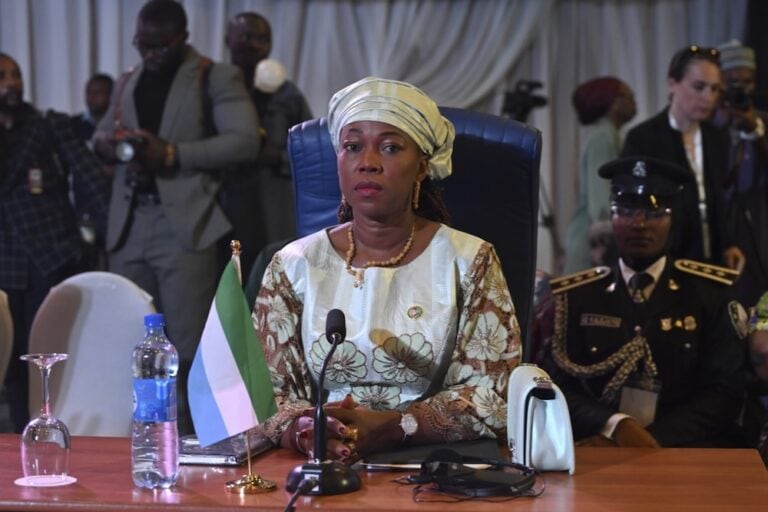
Journalist Chernoh Alpha Bah forced to remain in exile
Sierra Leonean journalist Chernoh Alpha Bah has faced an onslaught of online harassment and death threats over the last 4 years.

China shuts down journalist’s internet, cell service
Gao Yu told CPJ that she must go to a friend’s house or a restaurant to access the internet.

Authorities must urgently protect reporters from escalation in violence in Ecuador
Since the end of July, RSF has recorded at least six cases of attacks on journalists investigating the corruption surrounding the security crisis linked to the rise of organized crime in the country.
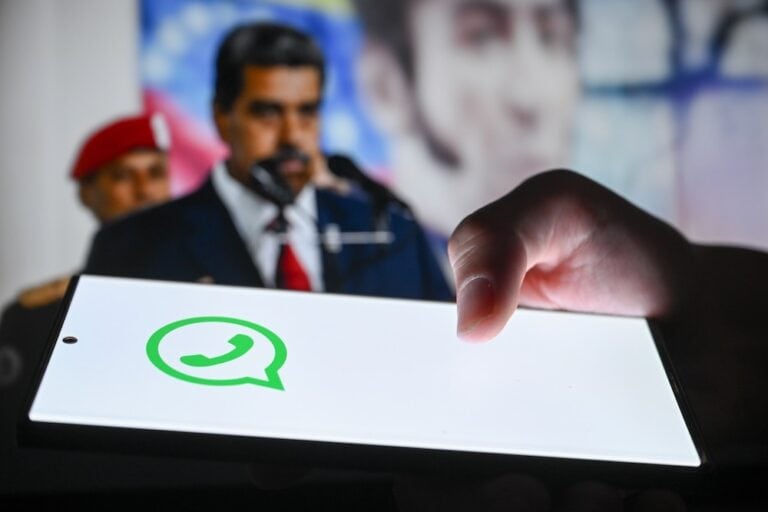
Venezuelans use AI avatars and Instagram Live to fight back against Maduro’s repression
President Nicolás Maduro’s regime has increased surveillance, persecuted political dissent, and blocked the flow of information online. Venezuelan journalists, activists and political dissidents are looking for ways to circumvent and report the abuse.
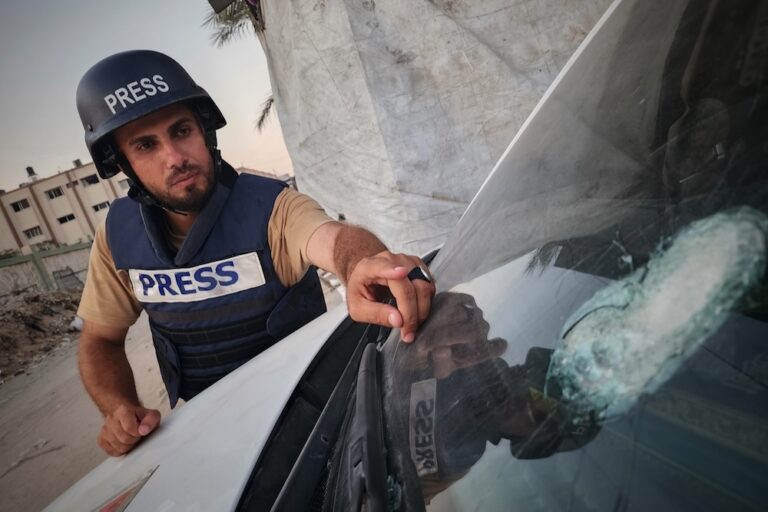
MENA’s Summer of repression: Journalists, activists, and free expression under siege
August 2024 in MENA: A free expression and civic space round-up produced by IFEX’s Regional Editor Naseem Tarawnah, based on IFEX member reports and news from the region.
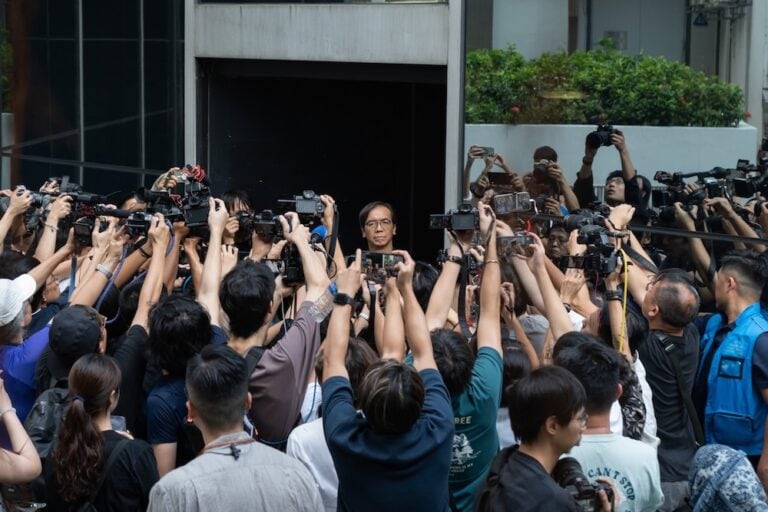
Hong Kong: Sedition conviction ‘exemplifies decline of press freedom’
This is the first sedition trial and conviction against a media outlet since Hong Kong’s Handover.

Azerbaijani authorities escalate crackdown on critics ahead of COP29
“Azerbaijan’s hostility towards independent civic activism raises serious concerns about whether human rights defenders, academics, journalists, and other independent members of civil society will be able to participate meaningfully at COP29″ – HRW
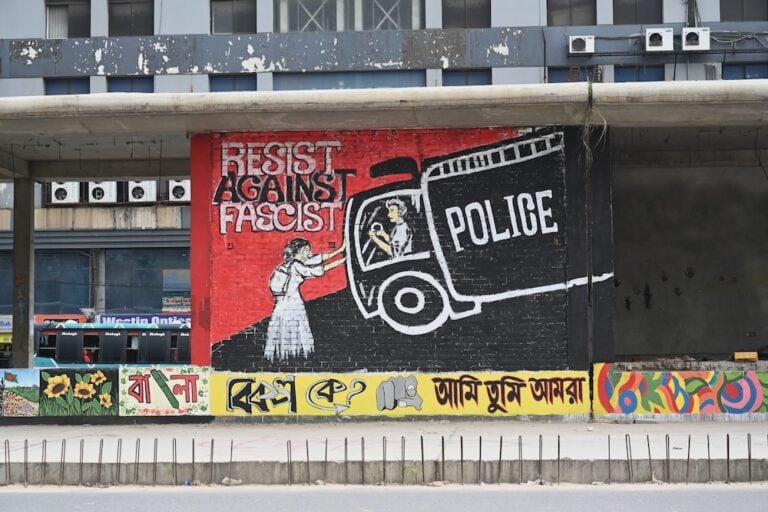
South Asia in focus: Youth-led uprising, women’s rights crisis, and internet disruption
August 2024 in South Asia: A free expression and civic space round-up produced by IFEX’s regional editor Mong Palatino, based on IFEX member reports and news from the region.

Escalating crackdown on free speech in the Gulf
Gulf states silence critics with harsh prison sentences and deportations, using vague laws to crack down on online dissent.

State repression intensifies in post-elections Venezuela, dangerous legislative changes in Uruguay
August in the Americas: A free expression and civic space round-up produced by IFEX’s Regional Editor Laura Vidal, based on IFEX member reports and news from the region.
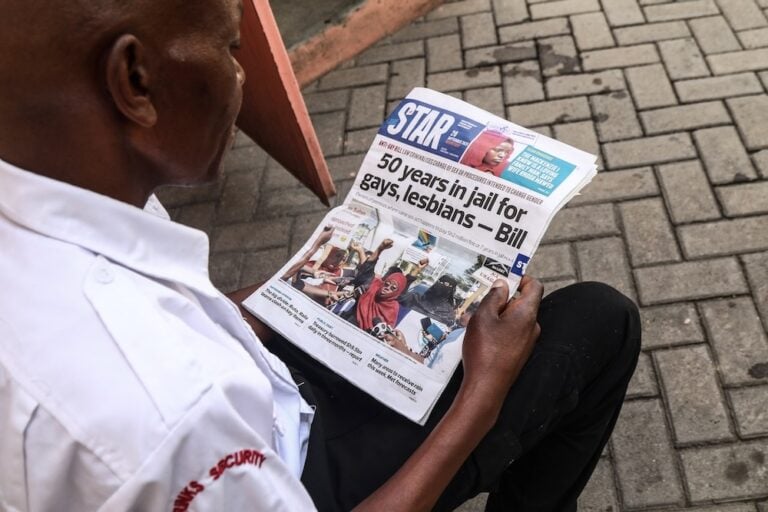
Ultra-conservative advocacy group pushing right-wing ideologies in Kenya
Spanish based organisation, CitizenGO, lends its support to politically motivated anti-LGBTQ+ rhetoric in Kenya.
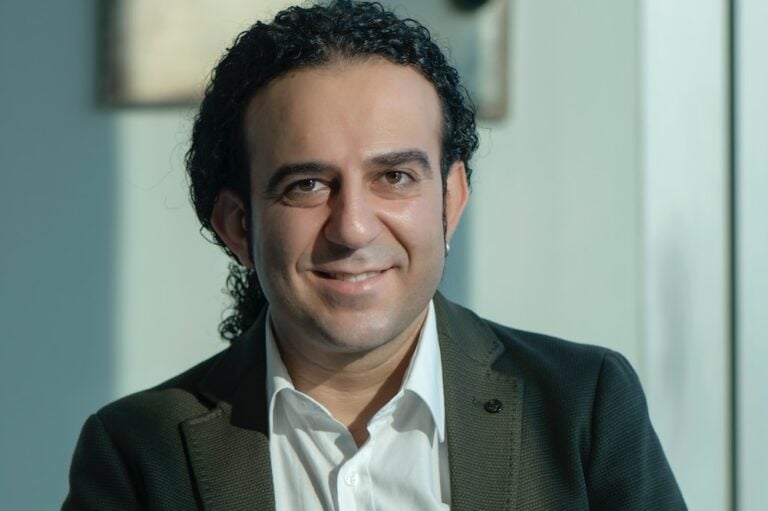
Turkey: Press freedom and freedom of expression groups condemn court decision upholding prison sentence for journalist Bülent Mumay
Mumay’s case is not an isolated incident but part of a broader pattern of judicial harassment and censorship targeting Turkey’s independent media. It highlights the urgent need for international attention to protect press freedom and the public’s right to information.
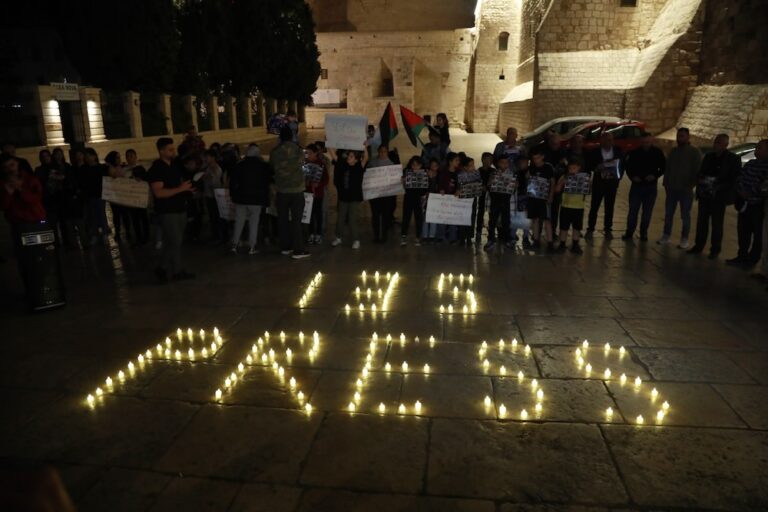
EU must take action against Israel’s unprecedented attacks on journalists and media freedom
IFEX joins calls on the EU to act decisively to protect press freedom and ensure accountability amid record journalist deaths in Gaza and severe media crackdowns in Israel and the Occupied Palestinian Territories.
Posts navigation
Like what you see here? Let's stay in touch
Get the latest free expression news delivered straight to your inbox.